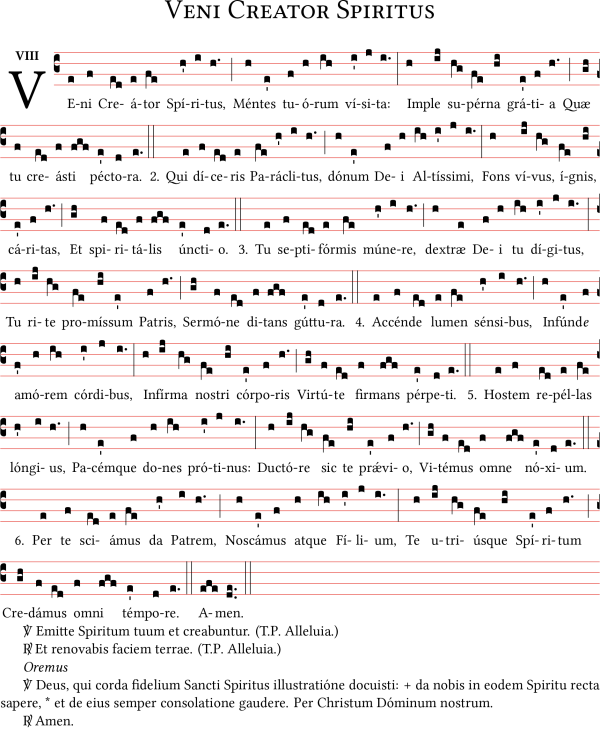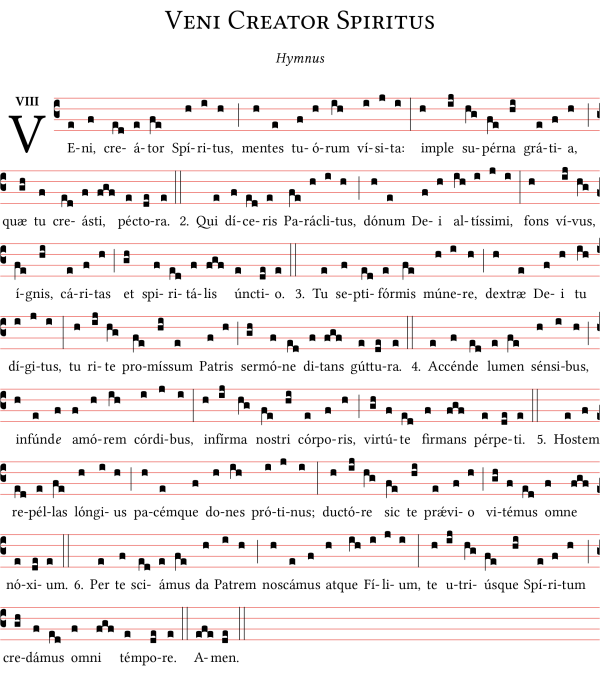Veni Creator Spiritus
Taken from WikiPedia.org
The Veni Creator Spiritus, in english Come, Holy Ghost, Creator blest, is a liturgical hymn dedicated to the Holy Spirit and attributed to Rabano Mauro, archbishop of Mainz, of the 9th century.
The best known version is the Gregorian one,[1] but it has also been set to music by numerous authors of polyphonic, classical and contemporary music.
It is regularly sung in the office of Lauds and Vespers on the feast of Pentecost and is often compared to the sequence Veni Sancte Spiritus.
In addition to Pentecost, it is also sung in particular solemn events to invoke the Holy Spirit, such as on the occasion of the conferral of the sacrament of confirmation and, according to tradition, of marriage. It is also sung during the election of the new Pope by the cardinals in the Sistine Chapel, for the consecration of bishops, for the ordination of priests, for councils and synods and for the coronation of a sovereign. By reciting it on the first day of the year, with the intention of invoking the Holy Spirit, on the beginning of the year, the plenary indulgence is gained[2]
Text and translations
Veni, creátor Spíritus, Qui díceris Paráclitus, Tu septifórmis múnere, Accénde lumen sénsibus: Hostem repéllas lóngius, Per te sciámus da Patrem, Amen.
|
Come, Holy Ghost, Creator blest, To Thee, the Comforter, we cry, The sev'n-fold gifts of grace are Thine, Thy light to every thought impart Drive far away our wily Foe, Make Thou to us the Father known; Amen |
In the Graduale Romanum, 1974, this prayer is also reported:
V. Emitte Spiritum tuum et creabuntur. (T.P. AllelUia.)
R. Et renovabis faciem terrae. (T.P. Alleluia.)
V. Oremus.
V. Deus, qui corda fidelium Sancti Spiritus illustratióne docuisti: + da nobis in eodem Spiritu recta sapere, * et de eius semper consolatione gaudere. Per Christum Dóminum nostrum.
R. Amen.
Musical Scores
Veni Creator Spiritus, Graduale Romanum, 1974, pag. 848
Gregorian score, laid out on A4 sheet:
Score available in PDF format laid out on A4 sheet, Media:VeniCreatorSpiritus.pdf
Veni Creator Spiritus, Antiphonale Romanum, 2009, Vol. 2 "Ad Vesperas in dominicis et festis", pag. 268 e 281
Gregorian score, laid out on A4 sheet:
Score available in PDF format laid out on A4 sheet, Media:Veni-Creator-Spiritus-antiphonale-romanum-2009.pdf
Video
Version taken from the Graduale Romanum 1974, p. 848, sung by the SCHOLA GREGORIANA MEDIOLANENSIS, Directed by Giovanni Vianini, Milano, Italia, http://www.cantogregoriano.it.
GABC Source Code
Veni Creator Spiritus, Graduale Romanum, 1974, pag. 848
name:Veni Creator Spiritus; office-part:Hymnus; mode:8; book:Graduale Romanum, 1961, p. 150* & The Liber Usualis, 1961, p. 885 & Chants of the Church, 1956, p. 157; transcriber:Andrew Hinkley; %% (c3) VE(e)ni(f) Cre(ed)á(e)tor(fe) Spí(h')ri(i)tus,(h.) (;) Mén(h)tes(e') tu(f)ó(h)rum(ih) ví(i')si(j)ta:(i.) (:) Im(h)ple(ij) su(hg)pér(fe)na(hi) grá(e')ti(f)a(h.) (;) Quæ(gh) tu(f) cre(ed)á(f)sti(fgf) péc(e')to(d)ra.(e.) (::) 2.() Qui(e) dí(f)ce(ed)ris(e) Pa(fe)rá(h')cli(i)tus,(h.) (;) dó(h)num(e') De(f)i(h) Al(ih)tís(i')si(j)mi,(i.) (:) Fons(h) ví(ij)vus,(hg) í(fe)gnis,(hi) cá(e')ri(f)tas,(h.) (;) Et(gh) spi(f)ri(ed)tá(f)lis(fgf) ún(e')cti(d)o.(e.) (::) 3.() Tu(e) se(f)pti(ed)fór(e)mis(fe) mú(h')ne(i)re,(h.) (;) dex(h)træ(e) De(f)i(h) tu(ih) dí(i')gi(j)tus,(i.) (:) Tu(h) ri(ij)te(hg) pro(fe)mís(hi)sum(e') Pa(f)tris,(h.) (;) Ser(gh)mó(f)ne(ed) di(f)tans(fgf) gút(e')tu(d)ra.(e.) (::) 4.() Ac(e)cén(f)de(ed) lu(e)men(fe) sén(h')si(i)bus,(h.) (;) In(h)fún(e')d<i>e</i>(f) a(f')mó(h)rem(ih) cór(i')di(j)bus,(i.) (:) In(h)fír(ij)ma(hg) no(fe)stri(hi) cór(e')po(f)ris(h.) (;) Vir(gh)tú(f)te(ed) fir(f)mans(fgf) pér(e')pe(d)ti.(e.) (::) 5.() Ho(e)stem(f) re(ed)pél(e)las(fe) lón(h')gi(i)us,(h.) (;) Pa(h)cém(e')que(f) do(h)nes(ih) pró(i')ti(j)nus:(i.) (:) Du(h)ctó(ij)re(hg) sic(fe) te(hi) pr<sp>'æ</sp>(e')vi(f)o,(h.) (;) Vi(gh)té(f)mus(ed) o(f)mne(fgf) nó(e')xi(d)um.(e.) (::) 6.() Per(e) te(f) sci(ed)á(e)mus(fe) da(h') Pa(i)trem,(h.) (;) No(h)scá(e')mus(f) at(h)que(ih) Fí(i')li(j)um,(i.) (:) Te(h) u(ij)tri(hg)ú(fe)sque(hi) Spí(e')ri(f)tum(h.) (;) Cre(gh)dá(f)mus(ed) o(f)mni(fgf) tém(e')po(d)re.(e.) (::) A(efe)men.(de..) (::)
Veni Creator Spiritus, Antiphonale Romanum, 2009, Vol. 2 "Ad Vesperas in dominicis et festis", pag. 268 e 281
name:Veni Creator Spiritus; office-part:Hymnus; mode:8; book:Antiphonale Romanum, 2009, pag. 268 and 281; transcriber:Stefano Ferri; %% (c3) VE(e)ni,(f) cre(ed)á(e)tor(fe) Spí(h)ri(i)tus,(h) (;) men(h)tes(e) tu(f)ó(h)rum(ih) ví(i)si(j)ta:(i) (:) im(h)ple(ij) su(hg)pér(fe)na(hi) grá(e)ti(f)a,(h) (;) quæ(gh) tu(f) cre(ed)á(f)sti,(fgf) péc(e)to(de)ra.(e) (::) 2.() Qui(e) dí(f)ce(ed)ris(e) Pa(fe)rá(h)cli(i)tus,(h) (;) dó(h)num(e) De(f)i(h) al(ih)tís(i)si(j)mi,(i) (:) fons(h) ví(ij)vus,(hg) í(fe)gnis,(hi) cá(e)ri(f)tas(h) (;) et(gh) spi(f)ri(ed)tá(f)lis(fgf) ún(e)cti(de)o.(e) (::) 3.() Tu(e) se(f)pti(ed)fór(e)mis(fe) mú(h)ne(i)re,(h) (;) dex(h)træ(e) De(f)i(h) tu(ih) dí(i)gi(j)tus,(i) (:) tu(h) ri(ij)te(hg) pro(fe)mís(hi)sum(e) Pa(f)tris(h) (;) ser(gh)mó(f)ne(ed) di(f)tans(fgf) gút(e)tu-(de)ra.(e) (::) 4.() Ac(e)cén(f)de(ed) lu(e)men(fe) sén(h)si(i)bus,(h) (;) in(h)fún(e)d<i>e</i>(f) a(f)mó(h)rem(ih) cór(i)di(j)bus,(i) (:) in(h)fír(ij)ma(hg) no(fe)stri(hi) cór(e)po(f)ris,(h) (;) vir(gh)tú(f)te(ed) fir(f)mans(fgf) pér(e)pe-(de)ti.(e) (::) 5.() Ho(e)stem(f) re(ed)pél(e)las(fe) lón(h)gi(i)us(h) (;) pa(h)cém(e)que(f) do(h)nes(ih) pró(i)ti(j)nus;(i) (:) du(h)ctó(ij)re(hg) sic(fe) te(hi) pr<sp>'æ</sp>(e)vi(f)o(h) (;) vi(gh)té(f)mus(ed) o(f)mne(fgf) nó(e)xi(de)um.(e) (::) 6.() Per(e) te(f) sci(ed)á(e)mus(fe) da(h) Pa(i)trem(h) (;) no(h)scá(e)mus(f) at(h)que(ih) Fí(i)li(j)um,(i) (:) te(h) u(ij)tri(hg)ú(fe)sque(hi) Spí(e)ri(f)tum(h) (;) cre(gh)dá(f)mus(ed) o(f)mni(fgf) tém(e)po(de)re.(e) (::) A(efe)men.(de) (::)
Bibliography
- Wikipedia.org, versione italiana, https://it.wikipedia.org
- GregoBase project, https://gregobase.selapa.net/
- Graduale Romanum, Libreria Editrice Vaticana 1974, pagina 848.
- Antiphonale Romanum, Vol. 2 Ad vesperas in dominicis et festis, Edizioni SOLESMES 2009, pagine 268 e 281.

